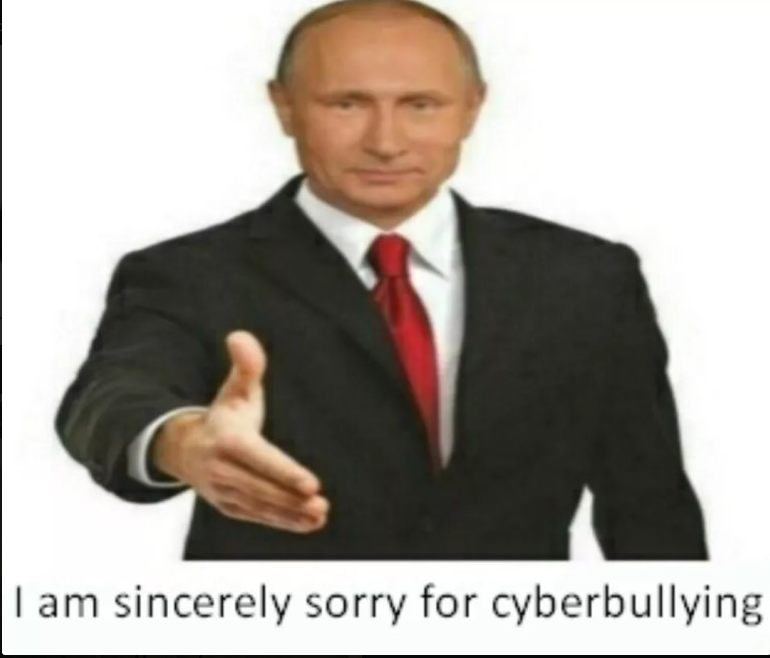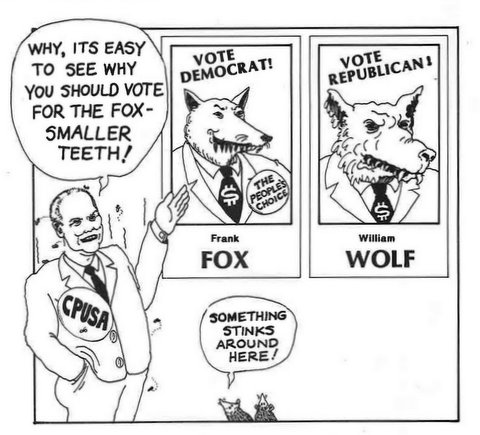The Democrats Have Nothing Left To Offer You
Renewed student loan payments. Increased drilling and oil extraction. Removal of all COVID protections. Strike-breaking. Increased border security and intensified detention and deportation of children and families at the southern border. Failure to codify gay marriage. Failure to codify the right to abortion. Failure to codify protection for trans people. Genocide. The Democratic Party comes to you with open hands and presents you these policy planks.
War. Pollution. Famine. Death.
The Biden-Harris campaign website doesn't have a single policy on it. Go and look. It urges you to donate, and nothing more. "Why should we tell you what our policies are?" they ask, their dead eyes mocking. "You know what our policies are: we're not Trump."
The political horizons of the Democratic Party have narrowed down to a single point. Once the party of "progressive" labor and struggles for racial recognition, the Democrats have jettisoned the last of their betrayed allies and have adopted a blank and stony face. They refuse to make the case for their administration, because they are no longer capable of doing so. As their policies and inaction increasingly alienate and repulse the masses, the only people still arguing on behalf of the Democratic Party are the so-called socialist parties of the United States Empire: the Democratic Socialists of America and CPUSA.
Why is this the case? Surely, there must have been a time when the Democratic Party had something to offer someone other than their ruling-class donors?
There was.
To understand what's become of the Democrats, and why they have increasingly tacked toward war abroad and law and order at home, you have to understand the history of the 20th century from the point of view of the ruling class. Of course, we're told one story --- the one that we all learn in high school history --- but the truth is quite something else.
The story we learn is one about Roosevelt and the New Deal, the incredible progressive dream of equality and freedom for all. We're told that basically only racists opposed the New Deal programs, that FDR brought about an era of prosperity never-before-seen by the United States, and that he "saved" the country from the Great Depression. This isn't just the story told by the Democrats, it's also the one told by the so-called Communists of the U.S. The problem is, none of it is true.
The New Deal With the Devil
To understand the limits of the Democratic Party, we need to begin with the historical composition of the so-called Democratic coalition and how the party realigned at the beginning of the 1930s. Labor unrest had rocked the young settler-republic: in 1877, workers established the brief but influential St. Louis Commune during the 1877 General Strike; nine years later, in 1886, the Haymarket Affair shook the country. In 1894, the Pullman Strike affected the railroads country-wide. The Coal Wars saw brutal repression of strikers by government troops and Pinkerton agents. In 1919, what came to be called the Red Summer reached near revolutionary fervor in the major cities, spurred primarily by class consciousness in the Black Belt and returning Black soldiers amidst the shadow of World War I. Acts of white supremacist terror and lynchings, meant to maintain the status quo, were confronted with fierce resistance from Black communities. Hundreds died. Nascent Black liberation movements, such as the African Blood Brotherhood were born from the ashes. This was followed by the 1921 Tulsa Massacre in Greenwood as white supremacist capitalism asserted itself over the wealthiest Black neighborhood in America by razing it and killing between 75 and 300 people.
In the face of this labor agitation came the Great Depression. The threat of the final and total overthrow of the capitalist order loomed large as the world capitalist economy melted down and threw twelve million people out of work. The capitalists scrambled to craft a policy reply to the crisis. It finally came in the form of European style social democracy. Thus was born the New Deal. In the words of conservative think-tank the Hoover Institute, the revolution never came because the "man in the White House co-opted the left."
But the New Deal didn't end the Great Depression. For white workers (and European workers aspiring to whiteness), it mitigated the worst harms of the economic collapse that we call the Great Depression, but it was only the outbreak of World War II that stopped the bleeding. Communists in the CPUSA went from accurately assessing FDR as a kind of fascist at the beginning of the '30s to openly embracing him by the end of the decade. In the process, they abandoned the revolutionary struggle and contented themselves with economic gains for the working class. The New Deal became the basis of an unsteady alliance between the officers of organized labor --- the AFL and other unions, primarily --- and the old Democratic party machine.
Government control of the centralized war production industry supercharged the U.S. economy and helped propel the settler-republic into the position of world hegemon. The U.S. stayed out of World War II as long as it could, letting the older empires slug out the fight, hoping that the USSR would be debilitated by their conflict with fascism. As a result, the ruined capitalist world was dominated in the post-war period by the U.S. Control over the complicated machinery of empire meant the U.S. imperial managers could funnel profits back into the domestic U.S. market --- and keep funding the social democratic project FDR had promised.
"The traditional colonialist powers represented by Britain, France, Holland and Belgium labored heavily under the War burdens, while Germany, Italy and Japan labored heavily under the burdens of defeat, a situation that enabled U.S. capital to extend and penetrate into all these countries through the reconstruction process," wrote the Marxist-Leninist People's Front for the Liberation of Palestine in its 1968 analysis of the world-imperialist bloc.
Breakdown
President Carter repudiated the deal between the Democrats and organized labor as the U.S. economy stalled and stagnated in the 1970s. This tack to the right was fully realized by Bill Clinton and the "Third Way" Democrats of the 1990s. The Clintonite period is where we get the term neoliberalism. Like neoconservativism, neoliberalism was a rejection of the traditional left-wing policies the Democrats embraced between 1932 and 1970.
It's easy to call policies neoliberal, but what does it mean? In content, neoliberalism is the shifting of state-sponsored programs into private hands so they can make a profit. The U.S. Empire never developed a strong welfare state like Europe --- despite Lyndon Johnson's attempts to do so, the security state and the military industrial complex demanded too much money and attention. Instead, it was always somewhat neoliberal, relying on private corporations to recognize their interests in forestalling revolutionary consciousness. These corporations invested in pensions, healthcare, programs, etc. for their employees... until Carter signaled the Democrats' willingness to turn on their one-time partners, the officers and bureaucrats of the labor unions.
Between Carter and Clinton, the Republican Party became the main vehicle for ruling-class action. Having repudiated the old progressive deal, the Democrats no longer had anything to offer the ruling class in terms of mass mobilization. Carter and Clinton, the bookends to Democratic control, were both indistinguishable from Republicans in their economic policy; Clinton, in fact, ran to the right of former CIA director H.W. Bush in 1992 on almost every economic issue.
The Obama Administration, despite its pretensions to restoring the voided social contract of the 1950s and 1960s, increased the party's commitment to neoliberalism and the degradation of unions. A financial catastrophe comparable to the stock market crash of 1929 put the Obama White House in a position quite similar to that of the FDR White House. However, since 1929, there had been major developments in the state's repressive machinery. No one was afraid of labor unrest or a looming revolution; the Occupy movement was easily disarmed and countered. What was the answer of the 21st century Democratic Party to the New Deal? FDR provided relief to the working class. Obama provided relief to the owning class.
To prevent total economic meltdown, the federal government infused the economy with new money; it "bailed out" banks. Not one of the criminal bankers responsible for the crisis was ever held accountable. The banking system itself was put on life support as federal regulators eased restrictions on lending that have remained in this "foot on the gas" position until this very day. Interest rates were cut, reserve requirements were overturned, and the U.S. (and thus the global) economy was puffed up on "aid" while still remaining fundamentally unsound.
Bidenomics and the Working Class
The economy is unsound because the rate of profit is in decline. Despite its sharp recovery after the life-support system installed by the Obama regime, it once again began to tumble and continues to fall to this day. This is the law of capitalism: the concentration of capital leads to declining rates of profit worldwide.
In the chart above, we can see the sharp spike in the rate of profit when the U.S. destruction of the Soviet Union brought markets back into the capitalist world, but even with this shot in the arm, the rate of profit continues to fall over time.
During the 1950s and 1960s, the rate of profit was appreciably higher than it is today. The rate of profit began to decline in the middle 1960s. It was at this time that the social-democratic program of the Democrats gave way to Carter in the early 1970s, and the breakup of union power with the failed Chrysler strike and culminating in the PATCO strike of the air traffic controllers. PATCO --- the Professional Air Traffic Controllers Organization --- was a trade union operating from 1968 until it was decertified in 1981. Just like the railroad workers that Biden forced back to work, PATCO demanded a shorter work-week to increase safety. Carter instructed the Federal Aviation Agency not to give in to the demand to provoke a strike he knew was in the offing. Reagan took up Carter's torch and, even though he had supported PATCO vocally during his election campaign, he followed the ruling-class line shared by Democrats and Republicans: the PATCO strike was declared illegal and the union was decertified.
The fact is that, as of Biden's assumption of power, the progressive potential of the Democratic Party has been completely exhausted. The chair of the party is Jaime Harrison, a "former" lobbyist for the Podesta Group where he represented Bank of America, Wells Fargo, Berkshire Hathaway, numerous pharmaceutical corporations, and Walmart. The main funding arm of the Democratic Party is run by the board member of a CIA cut-out, the National Democratic Institute, which often works with the infamous National Endowment for Democracy to instigate regime change in socialist or nationalist countries in order to make them palatable to American business interests.
This leads us to the Bidenomics of today: massive debt relief and loan programs for private businesses while the working class see only the steep climb of inflation. Prices have climbed 20% since the 2020 implementation of Biden's relief plan for the rich. Wages have risen, but only roughly 10% in that time. That means every dollar in 2024 can buy what 80 cents could buy in 2020 --- a devaluation that is now almost the equivalent of having robbed every working person in the United States of a quarter of their income. Getting paid an additional 10 cents on the dollar doesn't make that much better.
There is no appetite among the Democratic Party's ruling class supporters to budgeon any economic issue. We have seen Biden break rail strikes even when the rail workers repeatedly warned that the health and safety of the entire country was on the line. His administration is only interested in offering relief to one class: the ruling class. Since 2020, the concentration of wealth in the hands of billionaires has increased 70%. This is under Biden's watch.
What about social issues? These, too, have been surrendered by the Democrats. The Biden regime has failed to codify abortion at the federal level, failed to protect trans rights, which are under assault in the right-reactionary stronghold states of the South, failed to even try to hold the police accountable for violence doled out on oppressed communities (he's worked hard to increase police funding and presence in the wake of George Floyd's death), failed to stop the creeping entrenchment of crisis-fascism amongst the Republicans, and failed to step down from an aggressive, hawkish foreign policy that sees all countries and all realms of the earth as the prerogative of the U.S. Empire's intervention.
There Is Nothing Left
The last of the progressive elements in the Democratic Party were sacrificed to the profit drive long ago. Social democrats are merely chum in the water for fascist retrenchment. Today, they serve as seductive sheepdogs, struggling to lead the working people away from the realization that the entire system is corrupt.
The bargain is a raw one!
For too long, we have been induced to trade our economic freedom in exchange for economic security. Now, even the lure of security has been taken away. All that remains is the threatened cudgel of Trump. For this, it is clear, the Democrats love him. Oh, not the rank and file, not the Democratic voter, for whom Trump is the expression of every foul and carnal urge, but for the Democratic politician there could be no more effective whip to mobilize those disaffected portions of their former electorate.
"We have nothing to offer you. Don't look for us to offer you anything other than this: we aren't Trump."
That's not enough, Mr. Biden. We must not stand by and allow the Democrats to bully us into another unholy bargain. We must stand up against them.



Great read, but what is to be done? How can we organize a real movement (and not just a protest vote for Stein and/or West) to actually restore power to the working class?
I mean, I say this as a , what can we do outside of organizing our workplaces and building solidarity so that if a cool-zone moment happens, it isn't just individual layoffs or unemployment, but collective rage at the system?
, what can we do outside of organizing our workplaces and building solidarity so that if a cool-zone moment happens, it isn't just individual layoffs or unemployment, but collective rage at the system?
I feel like the protests against Israel are like, a great start, but reading If We Burn (shameless plug for the book club) has me wondering how to transform a movement like we have now into real praxis/change
Building against the ruling class starts at the bottom. We don't get to have shortcuts like the bourgeoisie have, as they can rely on the entire backdrop of capitalist society and its full propaganda apparatus for support.
The core goals are to create more of us, to test our strength, to adopt informed positions and to develop effective practice. We have to do all of these things at once. If you neglect any of them, the others fail.
The usual way to do this is by joining or creating an organization. The exact structure of this organization is not something to prescribe at this time. Instead, look for organizations that are serious about all of the above and how to avoid pitfalls of serving the org rather than the revolution. There are orgs that cover up abuses for petty reasons and for supposedly saving face for the org itself (it has the opposite impact, actually). There are orgs that adopt failed practices because they fail au internal criticism. There are orgs that are really just reading groups that don't even try to adopt real-world practice. There are orgs that are sorely misinformed, often as an entire tendency, and are highly counterproductive and even dangerous to others on the left (e.g. I know a Trot that was posting selfies at a recent highly illegal action). There are orgs that "play it safe" in tactics that are sure to "succeed" but where the actual impact or strength are not well-demonstrated by the action itself. Example: you're certain to get some pictures and talk to a few folks by holding some signs on a street corner but what does this say about your capacity as a organization? There are orgs that stagnate and fail to grow because they fail to really even try to authentically engage with younger people and because they have no political program into which people could slot themselves.
So I recommend joining and building an org, taking a critical approach to that org, gaining organizing skills as part of that endeavor, and being willing to leave that org to build something better if it turns out to have terminal faults, faults the org simply will not overcome. Things will get better and better through this process, building out better and better orgs and hopefully someday even merging them as we arrive at shared praxis and knowledge.
deleted by creator